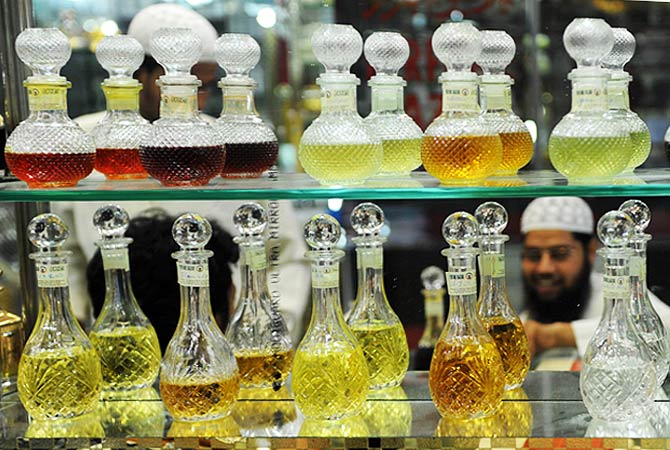In the remote town of Kannauj, the perfume capital of India, traditional workers are struggling to keep their craft alive in the face of fierce competition from modern fragrance makers. (For more photos, click here)
An Indian tests Ittar, perfume, before purchasing it at a shop in New Delhi.–Photo by AFPThis fight, between small businesses such as the Pragati Aroma Oil distillery and global groups such as Armani and Chanel, mirrors thousands of other battles across India between ancient practices and the forces of modernity.
Laxmi Narayan, 72, has spent the last 30 years making what is known as ittar, an oil-based perfume manufactured using a method dating back thousands of years.
"Ittar -making is a painstaking craft," Narayan told AFP through a cloud of thick smoke that billowed from wood fires set below a row of simmering copper pots that he was constantly monitoring.
"We rely on our instincts, we know the ittar is ready by the smell and feel of it," he added.
Sushil Singh, a supervisor at the distillery about 130 kilometres (80 miles) from state capital Lucknow in Uttar Pradesh state, believes machines can never take the place of experienced hands.
"The smell will be lost if we start using machines. People are forgetting the value of ittar. But we know what goes into (its) making. For us, attar is our life."
Each morning local farmers near Kannauj pluck bagfuls of rose, jasmine and other petals and deliver them to the nearby perfume distilleries dotting this sleepy town. In a process that can take days to complete, the flowers are mixed with water and heated in the copper pots. The aromatic steam is then transferred via a bamboo pipe to a receptacle containing sandalwood oil which acts as the base for the ittar.
But while it is still popular with natural fragrance enthusiasts, ittar is increasingly shunned by India's brand-conscious consumers who have become used to foreign products since economic reforms in the 1990s opened up the country.
Rising raw material costs, particularly of oil which must be imported because of limited production in India, are also a major headache.
"The ittar industry is gasping for survival," says Rohan Seth, the vice-president of the Fragrances and Flavours Association of India, an umbrella group of around 800 traders.
Located on the banks of River Ganges, the city of Kannauj was once a key trading centre for Indian perfumes, spices and silks that were sent mainly to the countries in the Middle East.
"Kannauj is to India what Grasse is to France. Here perfume-making is art. It is an integral part of the culture and heritage of the people," Shukla told AFP at the centre, surrounded by lemongrass, mint and henna shrubs.
The centre has been trying to help the farmers who pick the flowers and the perfume makers in a bid to stem the decline in the numbers of distilleries.
"The city boasted nearly 700 distilleries up until the late 1990s," said Pulkit Jain of Pragati Aroma Oil Distillers.
"Now the numbers have come down to about 150. Chemical alternatives and paraffin-based perfumes are much cheaper to make so it makes business sense to switch to these," Jain told AFP.
A study by the country's leading trade body ASSOCHAM in May this year said the domestic perfume market was seeing annual growth of about 30 percent and was currently worth about $270 million.
The sector, which includes ittar and other locally produced perfumes, accounted for nearly 30 percent of the total fragrance industry sales, it said.
Armani, Azzaro and Burberry were listed as the top three "most sold" leading perfume brands in the country, boosted by a trend for male grooming among urbane Indians, the report said.
Shukla of FFDC conceded the industry needed to find new uses for attar to stave off international competition, such as in aromatherapy where essential oils are used for their healing properties.
In the narrow winding streets of the old area of New Delhi, Praful Gundhi, 49, runs his perfume business which was started by his family in 1816 and draws well-heeled customers as well as those looking for cheap rip-offs.
His shop – Gulab Singh Johrimal – stocks perfumes in beautifully carved and coloured glass bottles displayed neatly on shelves all around.
Workers take great care to ensure the essence is not lost in the air as they prepare bottles tagged with names such as Iceberg, White Musk and Sandal Gold.
"Muslims form the biggest customer base for us because Islam prohibits them to use alcohol-based perfumes which is what most of the foreign brands are," said Gundhi, himself a Hindu.
"Even tourists coming to India flock to our shops because of the natural and organic quality of these perfumes. They know ittar is kind to the skin, you won't have any allergies."
Gundhi said he usually charged 14,000 rupees ($252) for 10 millilitres of pure rose oil but synthetic ones could be had for as cheap as 400 rupees ($8).
"It is all about taste and choice. The true connoisseur will not mind spending as long as he is satisfied about the quality."
But for many like Delhi businessman Anshul Agarwal, nothing compares to the high-end brands that he is fond of buying from the modern glass and steel shopping malls in the city.
"One of my friends had gifted me an ittar around a year back. It is still lying unused because I love my Calvin Kleins and Davidoffs," said the 34-year-old.













































